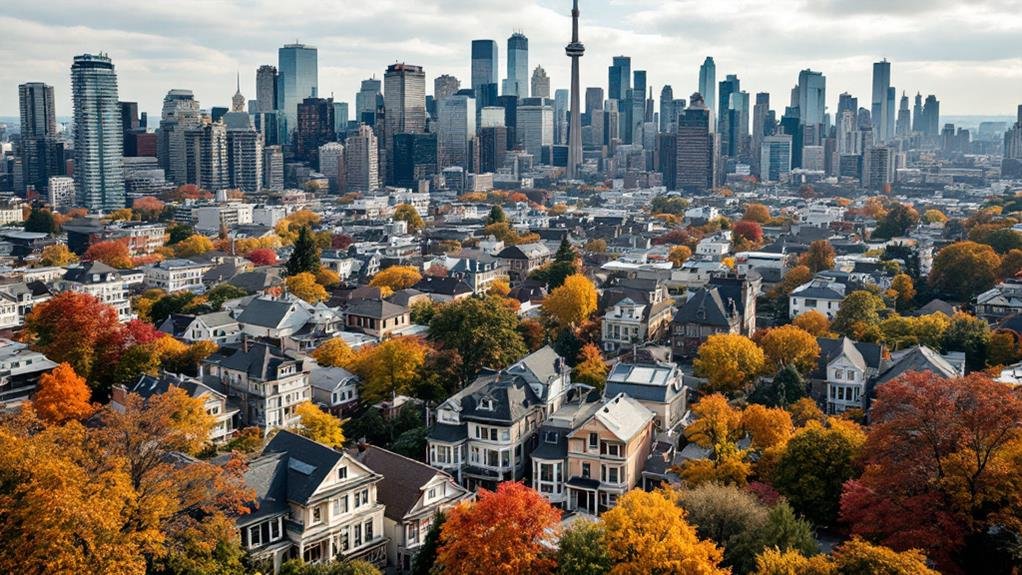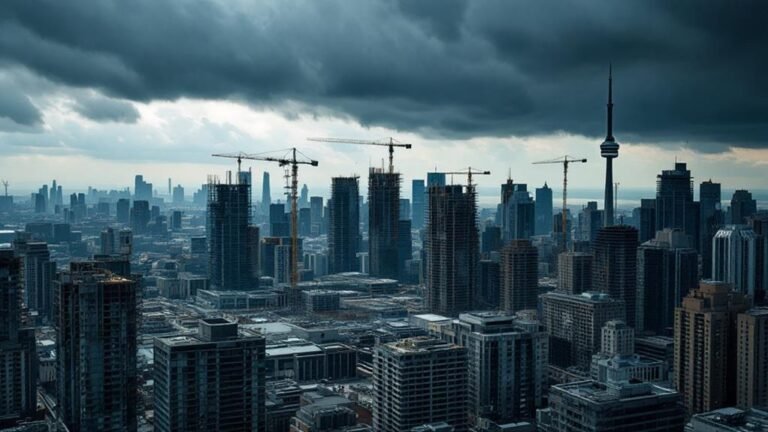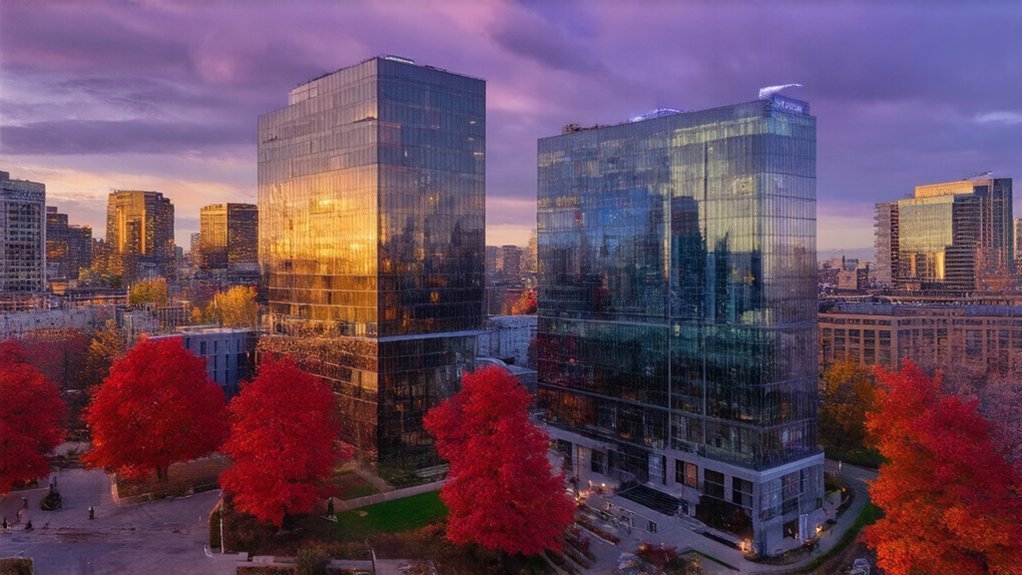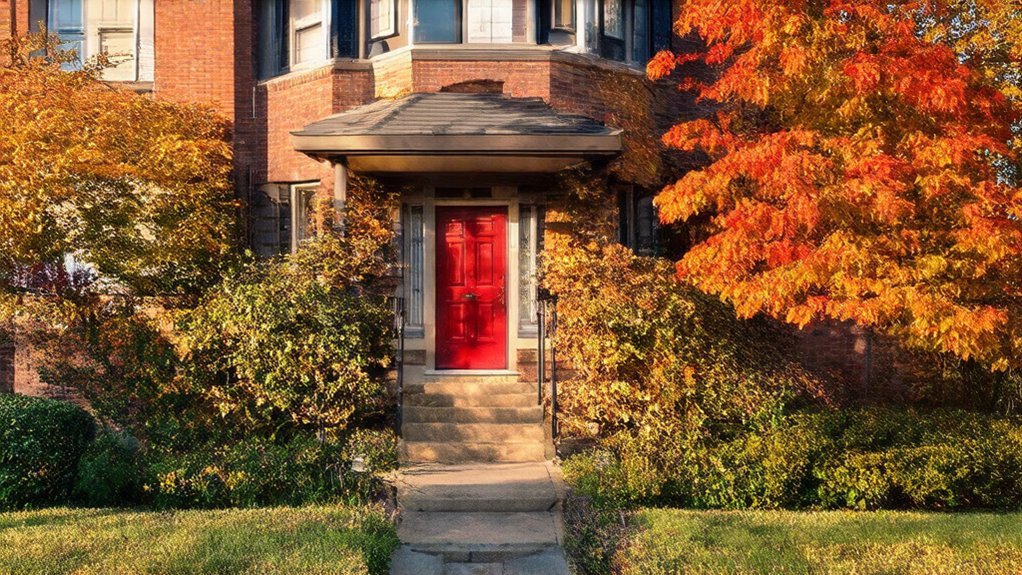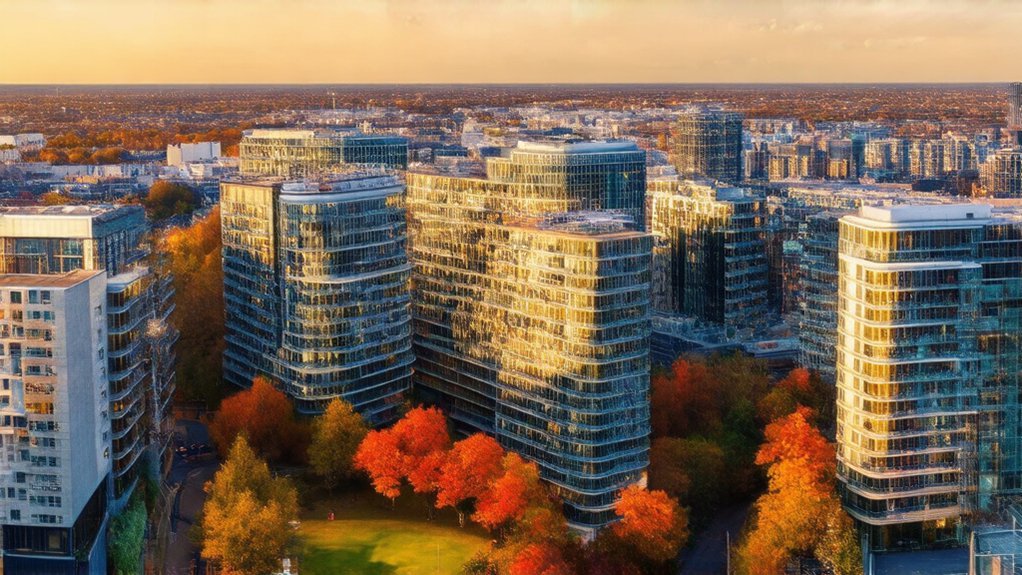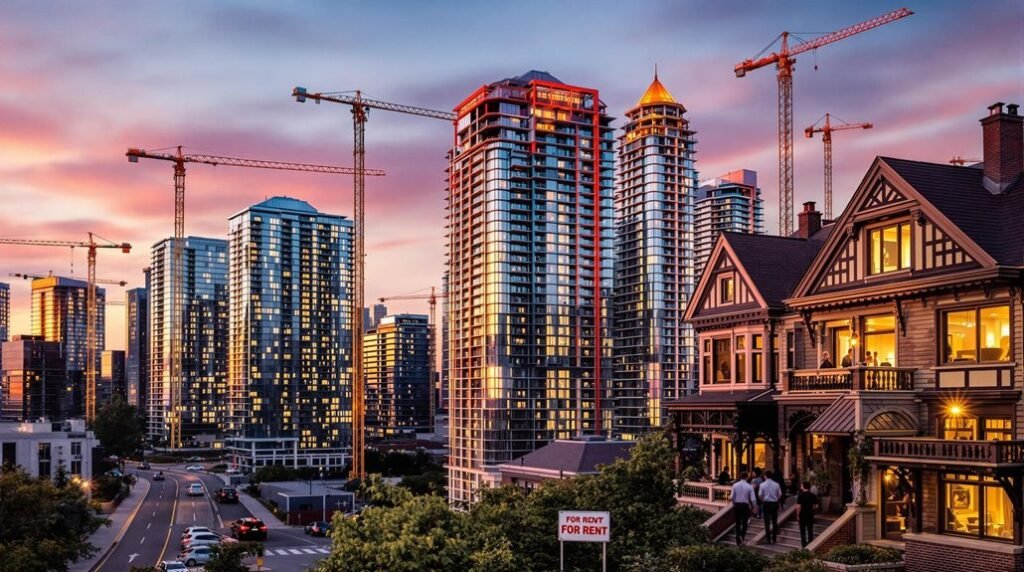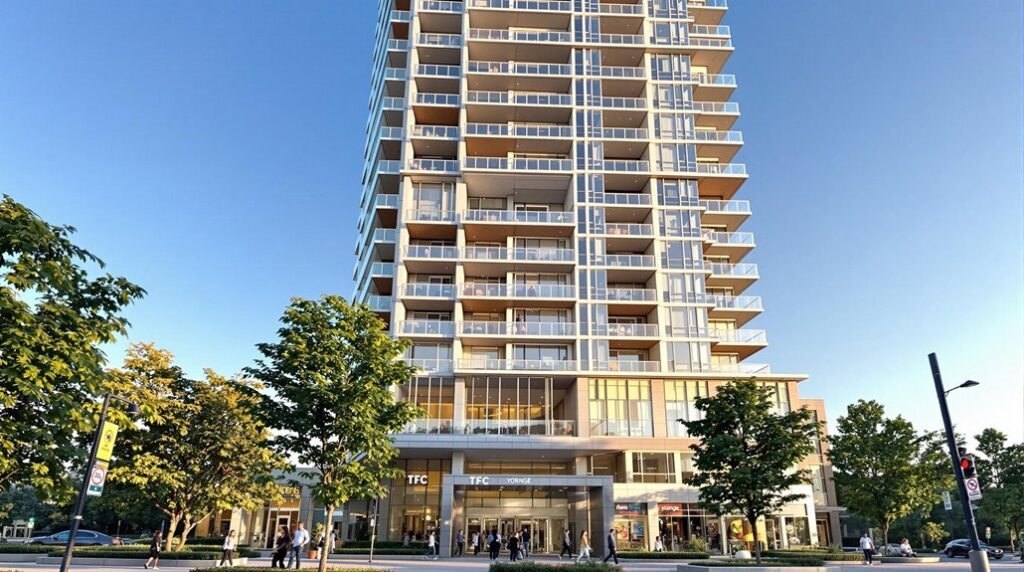As you navigate Toronto's dynamic real estate market, you'll quickly realize that local knowledge isn't just helpful—it's essential. Whether you're buying or selling, understanding the nuances of each neighborhood can make or break your transaction. From fluctuating property values to hidden gems in up-and-coming areas, the details matter. But it's not just about knowing current trends; it's about anticipating future changes that could impact your investment. With so many factors at play, you might wonder how to stay ahead in this competitive landscape. The answer lies in a deeper exploration of Toronto's diverse communities and the forces shaping them.
Key Takeaways
- Local market knowledge helps navigate Toronto's volatile price fluctuations and seasonal trends for optimal timing.
- Understanding neighborhood-specific factors like school quality and safety directly impacts property values and desirability.
- Awareness of transportation developments and accessibility influences investment decisions and property appreciation potential.
- Familiarity with zoning laws and future developments guides strategic buying and selling choices in different areas.
- Knowledge of community demographics and preferences helps target the right buyers or find suitable properties for specific needs.
Neighborhood Trends and Valuations

Diving into Toronto's real estate market requires a keen understanding of neighborhood trends and valuations.
Let's face it: without this knowledge, you're fundamentally flying blind in a market that's about as forgiving as a Canadian winter.
Think about it. How can you possibly make an informed decision when you don't know the average days on market for a property in Leslieville? Or the recent sales prices in The Annex? It's like trying to bake a cake without knowing the ingredients. Sure, you might end up with something edible, but it's probably not going to be what you wanted.
Local market knowledge is your secret weapon. It's the difference between making a smart investment and throwing your money into a black hole.
You need to know which neighborhoods are hot, which are cooling off, and which are about to explode onto the scene. And don't even get me started on community amenities. Schools, parks, shopping options – these aren't just nice-to-haves. They're the backbone of property valuations.
With average home prices in the Greater Toronto Area reaching $1,082,496 in August 2023, understanding these nuances is more vital than ever.
But here's the kicker: historical data. It's not just for history buffs anymore. Want to know if that trendy neighborhood is actually worth the hype? Look at its price fluctuations over the past decade. It's like a crystal ball for your investment future.
And let's not forget about zoning laws and upcoming developments. That quaint little neighborhood you're eyeing? It might be slated for a massive condo development next year.
Suddenly, your peaceful oasis is a construction zone. Not exactly the dream scenario, is it?
Market Cycles and Timing
When it comes to market cycles and timing in Toronto real estate, you're in for a wild ride. It's like trying to predict the weather in this city – one minute it's scorching hot, the next you're caught in a downpour. The market's no different, with prices swinging wildly month to month. Remember 2022? Yeah, that cooling period was a real eye-opener.
Here's the kicker: timing is everything. You've got to be savvy about when to make your move. Spring and early summer? That's when buyers come out of hibernation, ready to pounce. But don't be fooled – it's not just about the seasons. The recent Bank of Canada rate cut has thrown another variable into the mix, potentially influencing buyer behavior and market trends.
Local trends matter. A lot. You might think listing your property in May is a no-brainer, but have you considered what's happening in your specific neighborhood? Entry-level homes in one area might be flying off the shelves while high-end properties collect dust. It's enough to make your head spin.
And let's not forget about those pesky economic indicators. Rising mortgage rates? They can throw a wrench in your plans faster than you can say "bidding war." You've got to stay on your toes, anticipating shifts before they happen.
Look, I get it. It's frustrating. But here's the deal: if you want to play the Toronto real estate game, you've got to embrace the chaos. Monitor those trends, understand the cycles, and for heaven's sake, don't rely on outdated advice. Your wallet will thank you.
School Districts and Property Values
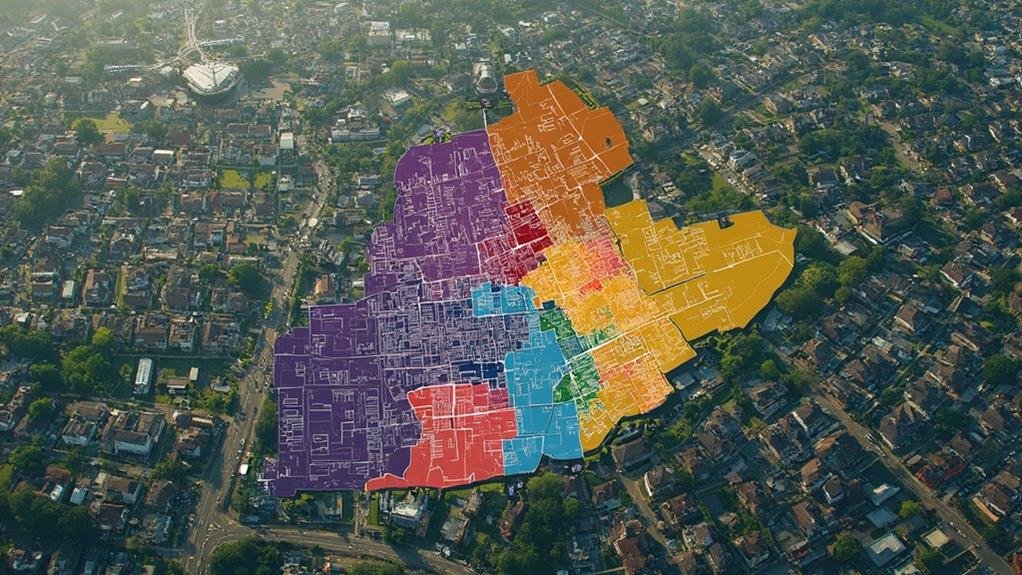
Speaking of factors that can make your head spin in Toronto real estate, let's talk school districts. It's not just about bricks and mortar anymore, folks. Your property's value is now tied to the nearest school's report card. Crazy, right?
In North York, this trend is especially apparent, with housing market diversity influencing school-related property values across different neighborhoods.
Here's the deal: homes near top-rated schools are like golden tickets. They're appreciating 10-20% faster than their less-educated counterparts. It's like your house is taking advanced placement courses in value growth.
Take Rosedale Junior Public School, for instance. Properties in its catchment area are fetching premiums of up to 30%. That's not pocket change – it's a whole new wardrobe of pockets.
But why? Simple. Parents are obsessed with giving their kids the best shot at success. They'll duke it out in bidding wars just to secure a spot in a good school district. It's like Black Friday shopping, but for education.
And get this: even when the market's doing the cha-cha, neighborhoods with ace schools stay steady. It's as if good grades are a bulletproof vest for property values.
Smart buyers are catching on, too. They're scouring school ratings like they're reading the sports pages.
Transportation and Accessibility Impact
You might think location is everything in Toronto real estate, but it's really all about getting there. Let's face it, what good is a prime spot if you're stuck in gridlock hell every day?
Toronto's transit system is a game-changer. Subways, streetcars, buses – they're not just for commuters; they're property value boosters. Living near a transit hub? Jackpot. You're sitting on a goldmine of convenience that buyers and investors are itching to get their hands on.
But wait, there's more. Highways matter too. The 401 and Gardiner Expressway aren't just concrete jungles; they're lifelines to the city. Proximity to these bad boys can send your property's appeal through the roof. It's like having a VIP pass to urban connectivity.
And don't get me started on walkability. Downtown core, Liberty Village – these aren't just hipster havens. They're hotspots for those who'd rather strut than drive. High walkability scores? Cha-ching!
Here's the kicker: the TTC's expansion. The Eglinton Crosstown LRT isn't just a fancy acronym; it's a property value multiplier. Reduced commute times? Yes, please!
But here's where it gets interesting. Planned developments are like crystal balls for savvy investors. New transit stations or road improvements on the horizon? That's your cue to pounce before everyone else catches on.
Zoning Laws and Future Developments
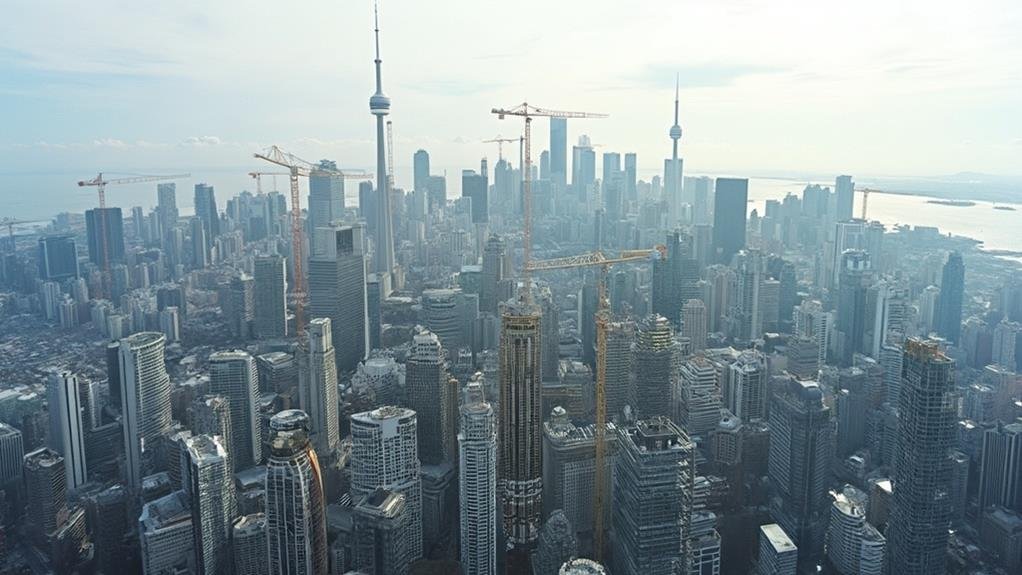
Zoning laws in Toronto aren't just bureaucratic red tape; they're the secret sauce of smart real estate investments. Seriously, if you're not paying attention to these regulations, you might as well be throwing darts at a map blindfolded.
Think about it. These laws dictate what can be built where, and that's a game-changer for property values. You wouldn't buy a car without knowing its potential, so why invest in real estate without understanding its future?
The Toronto Official Plan isn't some dusty document gathering cobwebs. It's a roadmap for the city's growth. Ignore it at your peril. Smart buyers and sellers are all over this stuff, using it to spot golden opportunities for redevelopment.
Meanwhile, everyone else is left scratching their heads, wondering why they missed out.
But here's the kicker: zoning laws aren't set in stone. They change, and when they do, it's like a seismic shift in the market. That transit expansion you've been hearing about? It could turn a sleepy neighborhood into the next hot spot.
Community infrastructure projects? They're not just feel-good initiatives; they're property value boosters.
Local Economic Indicators
Five key economic indicators are the pulse of Toronto's real estate market. You'd be foolish to ignore them. Population growth, employment levels, GDP growth, inflation rates, and interest rate fluctuations – these aren't just numbers on a spreadsheet. They're the lifeblood of your investment.
Let's get real. Toronto's population is booming, thanks to immigration and good old-fashioned baby-making. More people means more demand for housing. It's not rocket science, folks.
And guess what? The GTA's job market is holding strong. People with jobs buy houses. Shocking, right?
Now, here's where it gets interesting. The region's GDP is expected to grow by 3% in 2024. That's not too shabby. It means the economic engine is purring along nicely, keeping the real estate market revved up.
But hold your horses. Inflation's hit a 40-year high. Your money doesn't stretch as far as it used to. Remember when a loonie could buy you a coffee? Yeah, those days are long gone.
And don't even get me started on interest rates. They're like a rollercoaster ride for your mortgage. One minute you're cruising along, the next you're white-knuckling it through a loop-de-loop of affordability.
Crime Rates and Safety

Let's shift gears from economic indicators to something equally important for your real estate decisions: crime rates and safety. You'd think this would be straightforward, right? Wrong. Toronto's crime landscape is as complex as its real estate market.
Here's the deal: Toronto's crime rates are like a rollercoaster. Up, down, and all over the place. In 2022, violent crime jumped 5%. Scary stuff. But hold on – the overall crime rate is still lower than the national average. Go figure.
Now, here's where it gets tricky. Toronto's neighborhoods? They're as diverse in safety as they're in culture. Downtown's got more action than your grandma's bingo night, while places like Etobicoke are practically snooze-fests in comparison.
But don't take my word for it – the Toronto Police Service dishes out the dirt on crime stats by neighborhood. Use it!
Why should you care? Simple. Safety affects your wallet. A safe neighborhood is like a magnet for buyers, driving up property values faster than you can say "bidding war."
Meanwhile, high-crime areas? They're about as attractive as a root canal.
Look, I get it. You're not looking to become a crime analyst. But ignoring safety when buying or selling? That's like skydiving without checking your parachute. Risky business, folks.
Cultural Amenities and Attractions
Toronto's cultural scene is like a buzzing beehive of activity. You'd be hard-pressed to find a dull moment in this vibrant metropolis. With over 150 theaters and countless art galleries, you're never far from a cultural fix. It's almost overwhelming, isn't it?
Let's face it, the real estate game isn't just about bricks and mortar. It's about lifestyle, and Toronto's got that in spades. You've got the Toronto International Film Festival, Caribana, and Nuit Blanche. These aren't just events; they're cultural explosions that shape neighborhoods and property values.
And don't get me started on the food scene. 8,000 restaurants? That's not a dining landscape; it's a culinary universe. You're not just buying a home; you're buying into a global food tour.
But here's the kicker: it's not all highbrow stuff. Sure, you've got your Toronto Symphony Orchestra and National Ballet of Canada. But you've also got 1,500 parks and green spaces. It's like the city planners said, "Let's throw in some nature for good measure."
Look, if you're in the market for Toronto real estate, you'd better know your cultural hotspots. It's not just about square footage and subway access anymore. You're buying into a lifestyle, a community, a slice of this cultural pie.
Environmental Factors and Risks
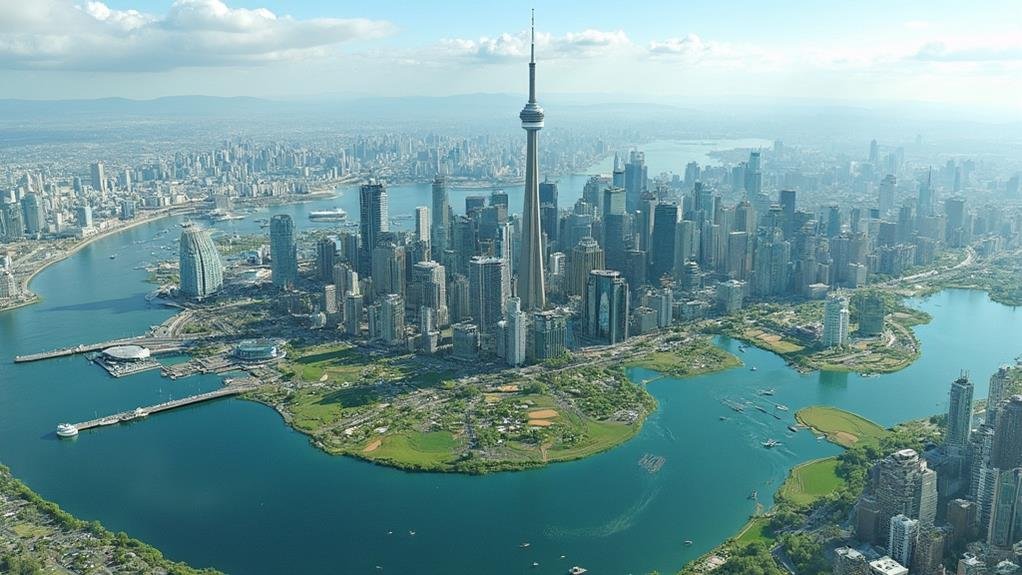
While Toronto's cultural scene might dazzle you, the city's environmental landscape can be just as impactful on your real estate decisions.
Let's face it: most buyers and sellers are clueless about the environmental factors that can make or break a property investment. You wouldn't buy a car without checking under the hood, so why would you invest in real estate without understanding the environmental risks?
Here's the kicker: local agents know stuff you don't. They've got the inside scoop on flood zones, air quality, and historical weather patterns. Think you can just Google that information? Good luck. It's not just about knowing where the data is; it's about understanding what it means for your property's value and livability.
Zoning regulations and land-use policies? They're not just bureaucratic nonsense. They can reveal potential environmental hazards that'll have you kicking yourself later.
And don't get me started on community initiatives. You might think that new recycling program is just feel-good fluff, but it could be a sign of a neighborhood on the up-and-up.
Urban planning and infrastructure projects aren't just inconveniences during your commute. They're reshaping Toronto's landscape, affecting everything from traffic patterns to green spaces.
You think you can predict how these changes will impact property values? Think again.
Look, buying or selling in Toronto isn't for the faint of heart. But with a local agent who understands these environmental factors, you're not just throwing darts in the dark.
You're making an informed decision that could save you from a world of regret down the line.
Community Demographics and Preferences
From within the heart of Toronto's diverse communities, a tapestry of demographics and preferences emerges, shaping the real estate landscape in ways you mightn't expect. It's not just about location anymore; it's about understanding the pulse of each neighborhood.
Let's face it: Toronto's growing like crazy. With 2.8 million residents and counting, the housing market's feeling the squeeze. But here's the kicker – it's not one-size-fits-all. You've got families flocking to Scarborough and North York for space, while millennials and young professionals are all about that downtown condo life.
It's like trying to fit square pegs into round holes if you don't know who's buying what and where.
Think about it. Nearly half of Toronto households are non-family individuals or couples. That's a game-changer for housing needs. You can't just slap up cookie-cutter homes and expect them to sell like hotcakes. People want homes that fit their lifestyles, not the other way around.
And don't get me started on the eco-warriors. They're willing to shell out extra cash for homes that won't make Mother Nature cry. It's not just about granite countertops anymore; it's about solar panels and energy-efficient appliances.
Conclusion
You can't afford to wing it in Toronto's real estate game. Local knowledge isn't just nice to have—it's your secret weapon. Don't be that person who loses out because they didn't do their homework. Seriously, would you buy a car without test-driving it? Then why jump into a million-dollar property decision blindfolded? Get smart, get local, and get ahead. Your wallet (and future self) will thank you. Trust me, it's worth the effort.


